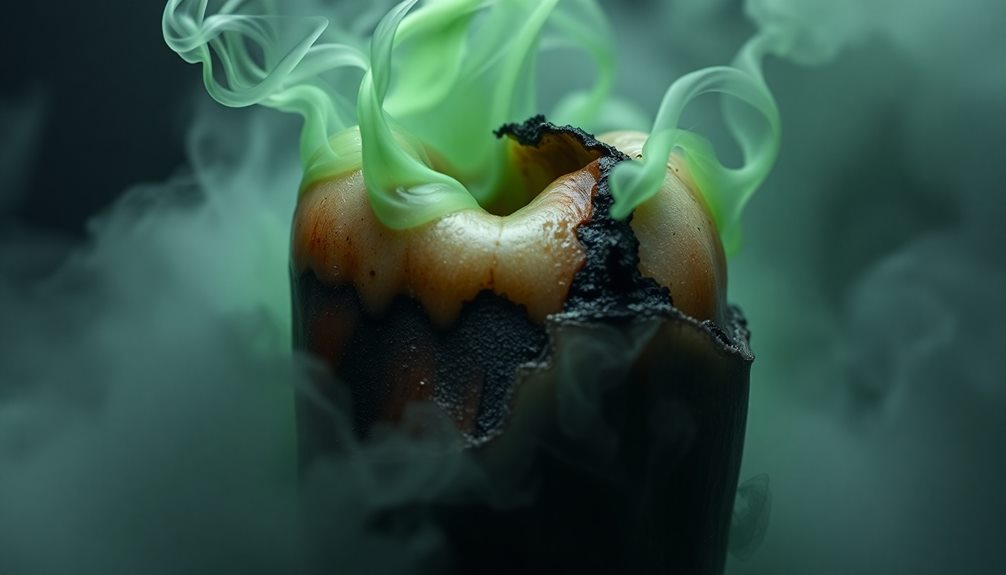A rotting tooth smells truly awful, often compared to spoiled food. You might notice a mix of sour and musty scents, with sharp, acrid hints that can really catch your attention. This unpleasant odor comes from bacteria feasting on food particles and decaying tissue, releasing gases like hydrogen sulfide, which can remind you of rotten eggs! If you skip brushing or avoid the dentist, the smell can get even stronger. This smell isn't just annoying; it signals deeper dental issues that need your attention. Stick around, and you'll find out more ways to keep your smile fresh!
Key Takeaways
- A rotting tooth emits a foul, pungent odor resembling spoiled food, with sour and musty qualities.
- The smell arises from bacteria breaking down food particles and decaying tissue, producing unpleasant waste.
- Sharp, acrid notes in the odor can cause discomfort and serve as a warning sign for dental issues.
- Infections can exacerbate the smell, releasing gases like hydrogen sulfide, which resembles rotten eggs.
- The presence of this odor often indicates neglected oral hygiene and potential health risks if untreated.
Introduction
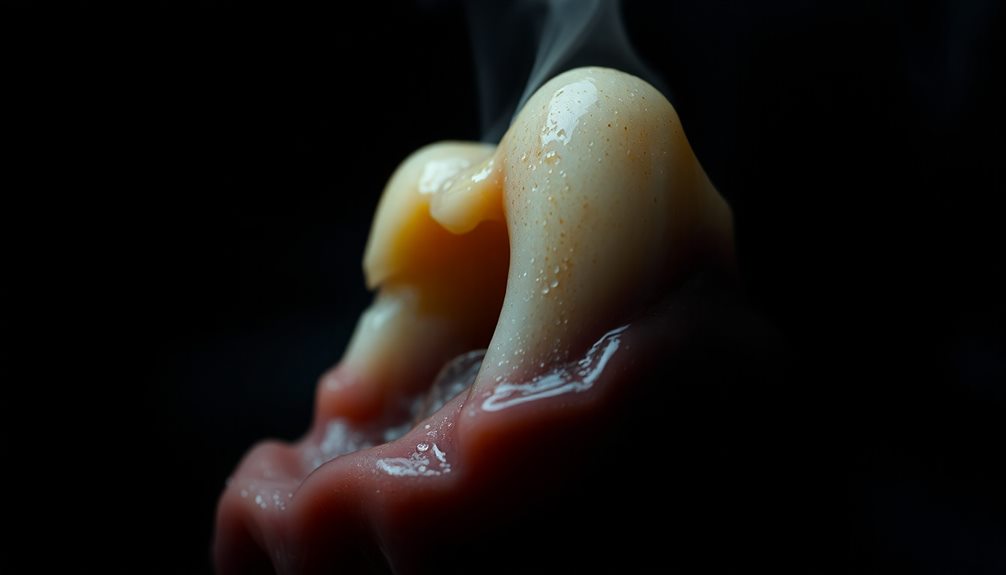
When you think about dental health, the last thing you want to imagine is the unpleasant odor of a rotting tooth. It's one of those things that can make you squirm just thinking about it!
But understanding this topic is important for keeping your smile bright and fresh. A rotting tooth can signal a lot of issues, not just bad breath. It usually means that decay has set in, and the bacteria are having a party in your mouth!
This decay can lead to pain, infection, and even tooth loss if you don't take action. You might wonder why it smells so bad in the first place. Well, it's all about the bacteria breaking down the food particles and tissues in your mouth.
The good news is that with proper care, you can prevent this situation. Brushing twice a day, flossing, and regular visits to the dentist can keep those nasty odors away.
Description of the Smell
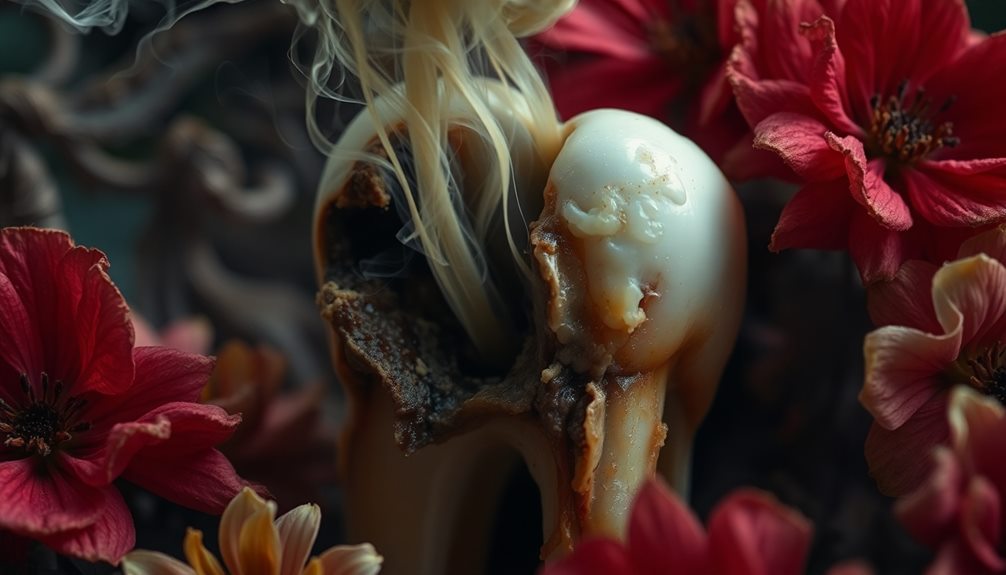
The smell of a rotting tooth is often described as a foul, pungent stench that can be hard to ignore. Imagine walking into a room where something's gone bad. You might catch a whiff of something sour, mixed with a hint of decay. It's the kind of smell that makes your stomach churn and your nose wrinkle.
When you think about it, this odor often has a deep, musty quality, almost like spoiled food left out for too long. You might notice a sharp, acrid note that can sting your nostrils, making you instinctively pull back.
If you've ever walked past a dumpster or an old, abandoned building, you might recognize that uncomfortable feeling when you catch a whiff of something unpleasant.
This smell can linger in the air, making it hard to focus on anything else. You can't help but be drawn to it, even if you wish you could turn away.
It's as if your senses are alerting you to something wrong, reminding you that dental care is essential. So, if you ever encounter this odor, it's a clear sign that you need to take action for your oral health!
Source and Composition
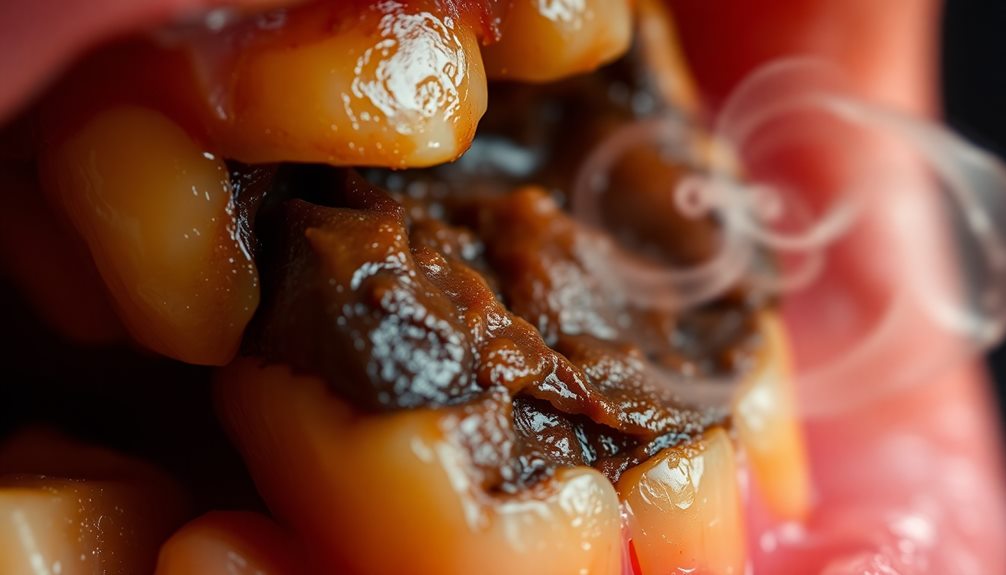
Numerous factors contribute to the foul smell of a rotting tooth, primarily stemming from bacteria and decaying tissue. When a tooth starts to decay, it creates a perfect place for bacteria to thrive.
These tiny creatures love to munch on leftover food particles and sugars, breaking them down and producing waste. That waste is what causes the unpleasant odor you might notice.
As the tooth decays, it also affects the surrounding gum tissue. The breakdown of this tissue releases more compounds that add to the smell. You might picture it as a mix of sour and putrid scents, making you wrinkle your nose in disgust.
Different types of bacteria produce various gases, like hydrogen sulfide, which smells like rotten eggs. Isn't it fascinating how something so small can create such a big stink?
Plus, if infection occurs, pus can form, contributing to that foul aroma.
Typical Scenarios or Environments
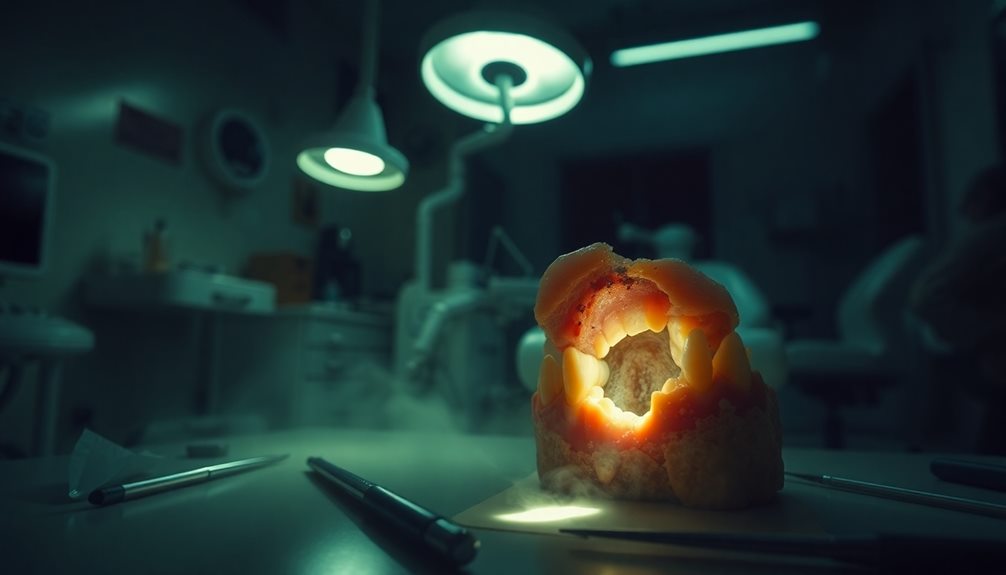
A rotting tooth smell often arises in everyday situations where oral hygiene is neglected.
Picture this: you wake up in the morning, feeling groggy, and skip brushing your teeth. As the day goes on, you grab a quick snack and forget to rinse your mouth. Over time, bacteria build up, and that unpleasant smell starts to creep in. You might notice it most during a casual chat with friends or while munching on popcorn at the movies.
Another common scenario is when people with dental issues avoid going to the dentist. They think, "It's not that bad," but the smell tells a different story. Whether you're at school, work, or hanging out with family, that rotting tooth odor can make its presence known, affecting your confidence and interactions.
Even if you're at home alone, the smell can be a constant reminder that something's not quite right.
Emotional or Cultural Associations
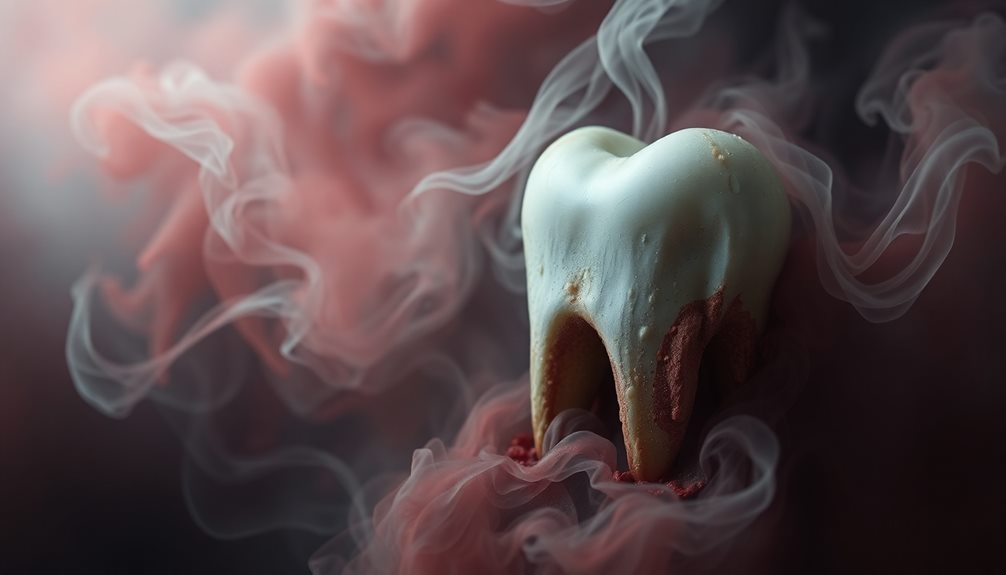
Smells often evoke strong emotions and memories, and a rotting tooth smell can carry a heavy cultural weight. You might remember a time when you encountered this scent, perhaps at the dentist's office or after a friend's unfortunate experience. This smell can trigger feelings of discomfort, fear, or even anxiety, reminding you of dental visits or the importance of oral hygiene.
In some cultures, a rotting tooth smell symbolizes neglect or bad luck. People might associate it with poverty or lack of access to dental care, creating a stigma around oral health. You might find it interesting that in folklore, a rotten tooth is sometimes seen as a sign of betrayal or dishonesty. The idea of decay can represent deeper issues, like the fragility of life or the inevitability of aging.
On the other hand, some cultures celebrate strong oral health as a sign of beauty and prosperity. The contrast between these views shows how smells can shape our understanding of health and social norms.
Next time you catch a whiff of that unpleasant odor, think about the emotions and cultural meanings tied to it. It's more than just a smell; it's a story waiting to be told.
Health or Safety Considerations
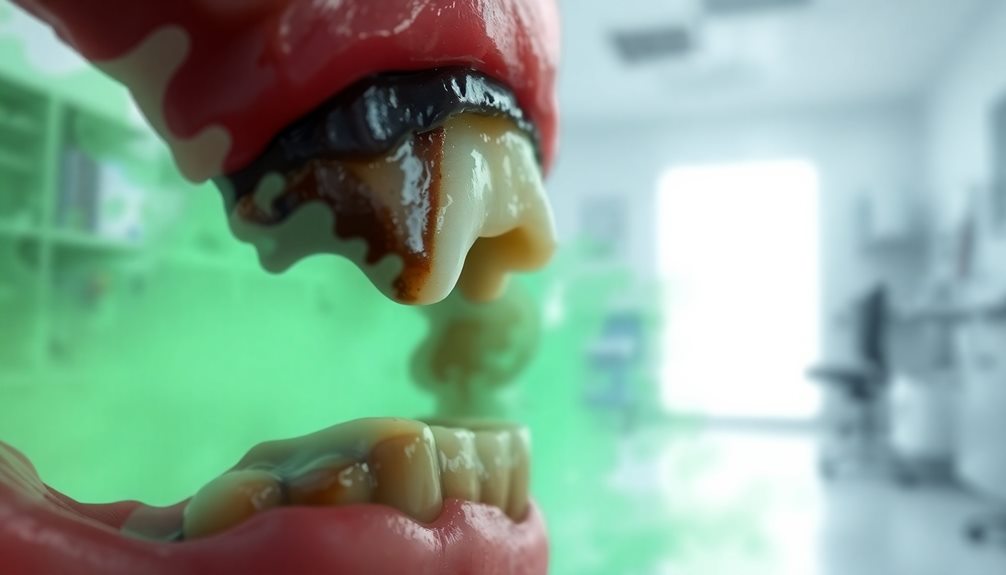
The discomfort associated with a rotting tooth smell isn't just psychological; it can also have real health implications. When you notice that unpleasant odor, it often means bacteria are at work, breaking down the tooth and surrounding tissue. This can lead to infections, which may spread beyond the mouth if left untreated. Imagine tiny invaders wreaking havoc in your body—yikes!
If you've got a rotting tooth, it's crucial to seek dental help. Your mouth is a gateway to your overall health, and ignoring a problem can result in serious issues like abscesses or even heart disease. Yes, that's right! Poor dental health can affect your heart and other vital organs.
Moreover, the smell itself can be a warning sign, alerting you to the need for improved oral hygiene. Brushing, flossing, and regular dental visits are your best defenses against tooth decay.
Don't wait until that odor is unbearable—take proactive steps to keep your mouth fresh and healthy. Remember, taking care of your teeth isn't just about avoiding bad smells; it's about ensuring your body stays strong and vibrant!
Final Thoughts
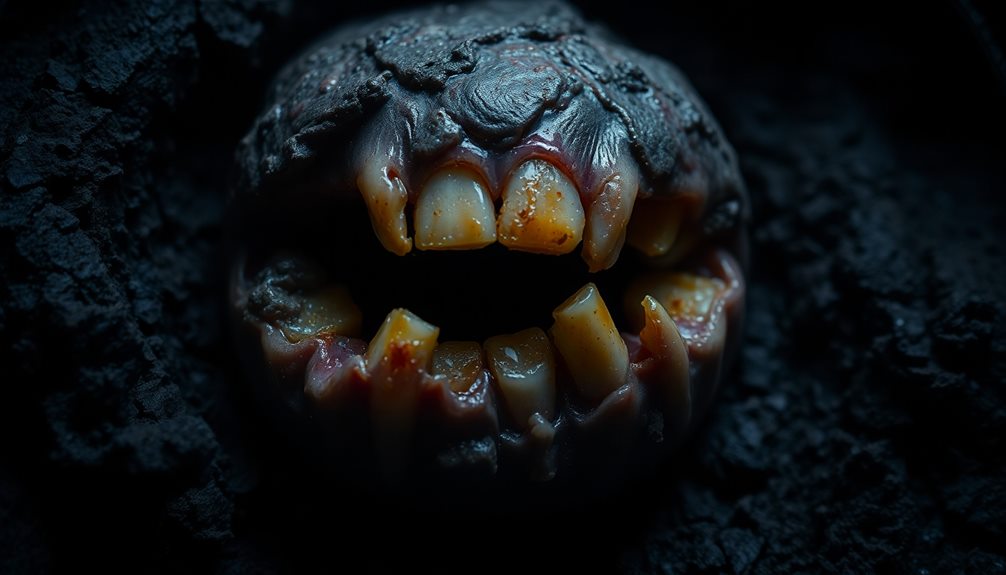
Taking care of your oral health is essential for overall well-being, and addressing issues like rotting tooth smell is a critical part of that. When you notice a bad smell coming from your mouth, it's not just unpleasant; it can signal deeper problems.
You might feel embarrassed or anxious, but don't let that stop you from seeking help. Regular dental check-ups can catch tooth decay before it gets worse. If you ever find yourself in a situation where you smell something foul, remember that it's your body's way of telling you something isn't right. It's important to be proactive!
Good oral hygiene, like brushing and flossing daily, can prevent issues and keep your breath fresh. Eating a balanced diet and drinking plenty of water also helps.
Think of your mouth as a garden; with the right care, it can flourish!
Frequently Asked Questions
Can a Rotting Tooth Affect My Breath Even if I'm Not Aware of It?
Yes, a rotting tooth can definitely affect your breath, even if you don't notice it. Bacteria buildup produces foul odors, and you might not realize how it impacts your overall dental hygiene and social interactions.
What Are the Nutritional Implications of Having a Rotting Tooth?
Having a rotting tooth can lead to poor nutrient absorption, affecting your overall health. You might struggle with eating certain foods, which can result in deficiencies and impact your energy levels and immune function.
Are There Home Remedies to Mask the Smell of a Rotting Tooth?
You can try rinsing your mouth with salt water or using essential oils like peppermint or tea tree oil to mask the odor. However, these remedies won't replace the need for professional dental care.
How Can I Prevent My Teeth From Rotting in the First Place?
To prevent your teeth from rotting, brush twice daily, floss regularly, limit sugary snacks, and visit your dentist for check-ups. Staying hydrated and chewing sugar-free gum also helps keep your mouth healthy and fresh.
What Dental Procedures Can Eliminate the Smell From a Rotting Tooth?
To eliminate the smell from a rotting tooth, you'll need a dentist's help. They can perform procedures like root canals or extractions, effectively removing decay and restoring your oral health, helping you feel fresher.
